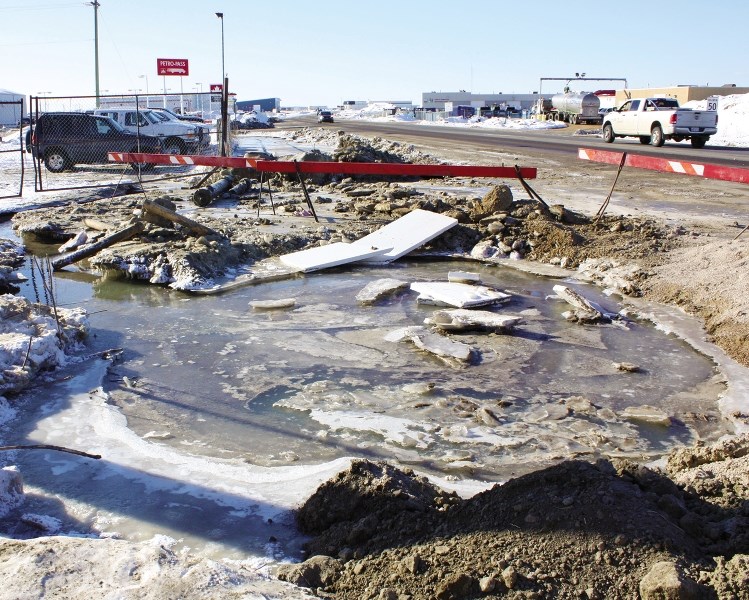A water main break on 51 Avenue last week has brought the urgency of replacing the town's old decaying water lines back to the forefront.
The cast iron water pipes that run under the majority of Bonnyville streets are declining with age and causing more and more problems for the town.
“It is basically the same age of pipe throughout this community,” said Mayor Gene Sobolewksi. “It is symptomatic, once you've reached your designed life you are going to expect these things to pop all over the place and that is what is going on. This is why we are so urgently and seriously trying to acquire different forms of funding because the infrastructure is crumbling all around us and it is getting quite serious.”
On Jan. 16, a water main on 51 Avenue broke again. A call alerting the Public Works department came around 3 p.m. according to Public Works and Utilities Director Lyndon Lay, and kept crews working until just after 1 a.m. to fix the problem. The break resulted in a section of the town going waterless for nearly six hours.
“The boys did a great job getting the water back going as fast as they could,” said Bonnyville CAO Mark Power. “But (breaks) are the ongoing issue that we have with the cast iron lines in 51 Avenue.”
Finding a solution to the aging infrastructure is the Town's top priority, and has been for years.
Plans to fix the pipes on 51 Avenue have been prepared and the town is “shovel ready” according to Sobolewski.
“It has been a priority for a while now,” said Sobolewksi. “We are planning on applying for the Building Canada Fund. We have the engineering done and we are waiting, which we have been for two years now, for the word to go and get this thing formally applied for.”
The town is in waiting mode as the Alberta government has yet to officially sign off on the Building Canada funding plan that was announced in early 2013.
The plan consists of a $10-billion provincial infrastructure component that has been allotted to support projects of national, regional and local significance. Once signed off, it would allow municipalities across the province to submit projects for funding. If approved the cost of the project would be split three-ways with the municipality, federal and provincial governments each picking up one-third of the bill.
Sobolewski is afraid the Building Canada Fund is not one of the Alberta government's top priorities, and fears provincial spending will be cut back for municipalities.
With that in mind, the local Mayor has started to explore other funding options.
“There is an urgency to try and find an alternate source of funding, for example the Regional Opportunities committee,” said Sobolewski, referring to a new committee whose main talking point is the surplus funds from the Cold Lake Air Weapons Range.
We are trying to locate other sources of funding that can help sustain us.”
Bonnyville already faces a large infrastructure deficit, and the complete overhaul of 51 Avenue will do nothing but deepen that hole.
The first phase of the project, which will see the street ripped up and water pipes replaced from the Post Office (50 Street) all the way over to 46 Street, is estimated to cost $5.8 million.
“We already have somewhere around $200,000 to $300,000 in infrastructure deficits in this town,” said Power. “We are in dire straits.”
Town Council is expected to discuss the issue tonight (Jan. 27) at their regular council meeting. Councillors and administrators will be looking for other possible ways to get the project done, which will include exploring other possible funding options.
“I've got a whole bunch (of other solutions) that I can suggest but most of them involve deferring other projects or going into debt,” said Power. “I don't have any magic money yet.”
Sobolewski feels the problem is something that needs to be solved sooner rather than later and would like to see the project tender before the short construction season is too far gone.
“Water breaks are something every community has to put up with, but when you take a look at the amount of water breaks and the sheer density of them in the areas where we have our old infrastructure, it speaks volumes,” Sobolewski added.



